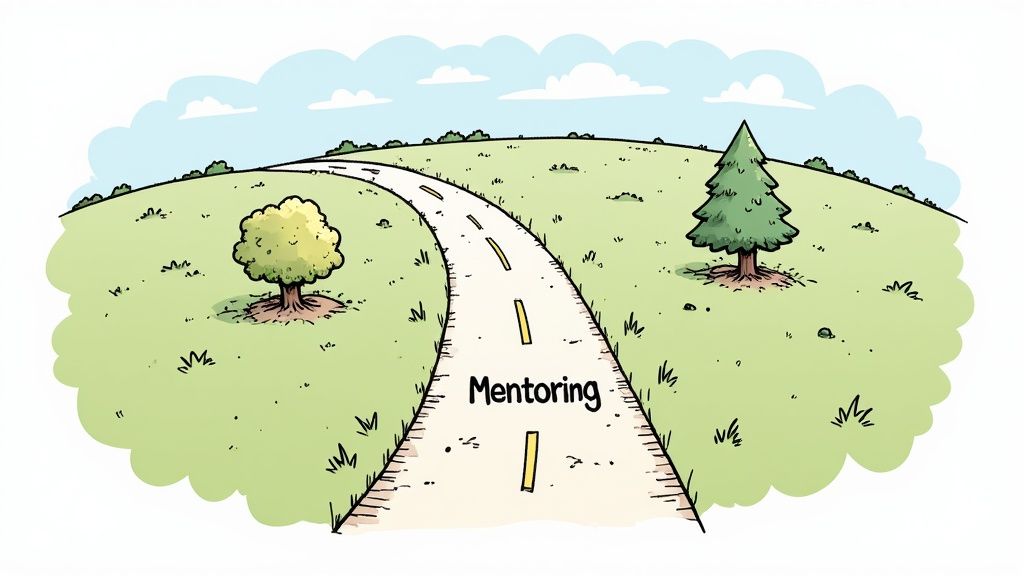Coaching vs Mentoring: Understanding the Critical Differences for Professional Growth


The Time Investment: Understanding Short-Term vs Long-Term Development Paths
Professional development through coaching and mentoring requires different time investments. This key difference shapes how each approach works, what goals you can achieve, and the impact on your career growth. Let's explore the distinct time commitments for each path.
Coaching: Focused Intensity for Short-Term Gains
A coaching relationship typically lasts a few weeks to several months, with clear start and end dates. This concentrated format allows you to work intensively on specific skills or challenges. For example, you might work with a presentation coach for 8 weeks to prepare for an upcoming conference keynote. The short timeframe creates momentum and accountability for rapid skill development.
Mentoring: Cultivating Long-Term Growth and Relationships
Mentoring relationships often span multiple years, developing organically over time. This extended connection allows mentors to share deep industry wisdom gained through decades of experience. A mentor becomes a trusted advisor who can guide you through various career transitions and challenges. The relationship evolves as your career grows, providing consistent support and perspective.
According to the Institute of Directors, coaching focuses on specific performance goals over a fixed period. In contrast, mentoring provides ongoing guidance that can last years as you develop professionally. A coach helps you master particular skills, while a mentor offers broad career wisdom and industry insights.
Choosing the Right Path: Aligning Time Investment with Your Goals
Your choice between coaching and mentoring should match your current needs and career stage. Consider these key questions:
- Do you need quick improvement in a specific skill area?
- Are you looking for ongoing guidance to navigate your career path?
- What time commitment can you realistically make?
If you want to rapidly develop a particular competency, coaching's focused approach may work best. For long-term career development and industry wisdom, mentoring provides sustained support. Understanding the different time investments helps you select the path that best fits your goals and availability.
Both approaches offer unique benefits - the key is matching the time commitment to your professional development needs. By choosing the right format, you can make the most of either coaching's intensive focus or mentoring's extended guidance.
Setting and Achieving Goals: Task-Focused Performance vs Holistic Career Growth

The approaches to professional growth through coaching and mentoring have distinct differences in goal-setting methods. While both aim to develop talent, they serve different purposes. Coaching focuses on improving specific performance areas with measurable outcomes. Mentoring takes a broader view, nurturing overall career development and long-term growth.
Coaching: Targeted Interventions for Measurable Results
When you work with a coach, the first step is setting clear, achievable goals. These are typically short-term and focused on building specific skills or addressing particular challenges. For example, improving presentation skills within a defined timeframe through structured practice and feedback. Progress tracking is essential in coaching relationships, with success measured against specific benchmarks. This structured approach ensures clear steps toward desired outcomes.
Mentoring: Guiding Long-Term Career Trajectories
Mentoring looks at the bigger picture of career development. Drawing from their experience, mentors help guide career transitions, develop leadership abilities, and expand professional networks. The relationship focuses on sharing wisdom gained through experience and understanding industry dynamics. Mentors provide valuable insights for making informed career decisions. Research shows that long-term mentoring relationships particularly benefit career advancement and overall professional growth. Learn more about mentoring approaches.pdf)
Integrating Both Approaches for Comprehensive Development
Many successful professionals combine coaching and mentoring for maximum benefit. They might seek coaching to strengthen specific abilities like negotiation skills while relying on a mentor for guidance on broader career moves. This dual approach offers both targeted skill improvement and strategic career direction. By understanding these distinct benefits, professionals can better plan their development path and achieve both immediate and long-term career goals.
Building Professional Relationships: Structured Guidance vs Natural Evolution

The relationship between a coach and client differs significantly from that of a mentor and mentee. Understanding these key differences helps professionals make informed choices about which type of guidance best fits their needs. Each relationship brings unique benefits that can shape your career growth in different ways.
Coaching: A Structured Alliance
A coaching relationship follows a clear structure and format. Like working with a personal trainer, coaching involves specific goals, defined timeframes, and regular check-ins. This framework creates strong accountability and makes it easy to track progress. For instance, if you want to improve your public speaking abilities, a coach might create a 3-month program with weekly sessions focused on specific techniques and measurable improvements.
Mentoring: An Organic Connection
Mentoring takes a more natural and flexible approach. Think of it as having an experienced guide who shares wisdom from their own journey. These relationships often form through shared interests or experiences and develop over time. Mentors draw from their personal career experiences to provide broader insights that complement focused skill-building. This creates meaningful long-term bonds built on mutual understanding.
Fostering Trust and Accountability
Both coaching and mentoring require trust and commitment to succeed. Coaching builds accountability through regular progress reviews and clear milestones. In mentoring, accountability emerges through ongoing dialogue and mutual respect rather than formal checkpoints. Success depends on both parties staying engaged and contributing to the relationship's growth.
Maximizing the Value of Each Relationship
Many successful professionals benefit from both coaching and mentoring throughout their careers. They might work with a coach to master specific skills while seeking broader career guidance from a mentor. This combined approach provides both targeted improvement and long-term career wisdom. Understanding when to use each type of relationship helps professionals make the most of these valuable development opportunities.
Professional Development: Strategic Skill Building vs. Natural Growth
The fundamental methods of building expertise in coaching and mentoring are quite different. While both methods aim to build professional abilities, they take separate paths. Coaching uses planned skill-building activities, while mentoring relies on learning through shared experiences. Knowing these key differences helps you pick the right path for your goals.
Coaching: Focused Skill Development
Coaching centers on building specific abilities through a clear, time-bound process. Much like working with a fitness trainer, you follow a defined plan with measurable targets. A coach might help you become a better public speaker by watching your presentations and giving specific tips to fix weak points. They use proven methods and tools to find gaps in your skills and track your progress. This focused approach helps you stay on track and see real improvements.
Mentoring: Natural Learning Through Experience
Mentoring takes a broader view, helping you grow over time in your career. A mentor shares real lessons from their work history to help guide your path. Think of them as an experienced guide who knows the terrain of your industry. They help you understand complex workplace situations by sharing their own successes and mistakes. This natural learning style helps you grasp the finer points of your field. Mentors provide support and wisdom to help your overall career development, rather than focusing on specific skills.
Getting the Best of Both Worlds
Coaching and mentoring work well together, even though they're different. Many professionals benefit from using both approaches. A coach can help perfect certain skills, while a mentor offers broader career advice and industry knowledge. This combined strategy supports both quick wins and long-term success. For instance, you might work with a coach to improve your deal-making skills while getting advice from a mentor about changing career paths. Using both methods helps you grow faster and achieve both immediate and future goals. Understanding how coaching differs from mentoring lets you create the best plan for your professional growth.
Measuring Professional Impact: Performance Metrics vs Career Advancement

When assessing how coaching and mentoring affect your professional growth, it's essential to examine both performance metrics and career advancement. These two factors provide different insights into measuring success and planning your career path.
Performance Metrics: Gauging Short-Term Success
Coaches often rely on clear, measurable goals to track progress. The focus is on specific targets that can be tracked and measured over time. For example, a sales professional might aim to increase revenue by 20% in six months, or a project manager might work to reduce delivery times by 30 days. These concrete goals help professionals build specific skills and see real progress quickly.
Key benefits of using performance metrics:
- Clear Goals: Easy-to-follow targets that show your progress
- Regular Check-ins: Scheduled reviews to keep you on track
- Quick Wins: Visible results that boost confidence
Career Advancement: Tracking Long-Term Growth
The mentoring approach takes a broader view, focusing on overall career development. Success is measured through major career milestones like earning promotions, taking on leadership roles, or managing important projects. This method helps professionals build lasting relationships and develop leadership abilities that serve them throughout their careers.
Signs of career growth:
- New Responsibilities: Moving into more senior positions
- Stronger Networks: Building valuable professional relationships
- Professional Recognition: Earning respect in your industry
Combining Metrics for Holistic Development
Using both short-term metrics and long-term career tracking gives you the full picture of your professional growth. Many people work with coaches to improve specific skills while relying on mentors for big-picture career guidance. This balanced approach helps track both current achievements and future goals.
Create a complete development plan that includes:
- Weekly Goals: Track progress on current projects
- Career Planning: Review long-term goals every quarter
- Mentor Guidance: Regular discussions about career direction
By measuring both immediate results and long-term progress, you can build a successful and meaningful career. Find more coaching resources at Coaching Hub.
Making Strategic Choices: Selecting the Right Development Path

Choosing between coaching and mentoring can feel challenging when planning your professional growth. Both approaches offer distinct benefits, but understanding their key differences will help you select the best option for your needs.
Identifying Your Needs and Goals
Start by getting clear on what you want to achieve. Are you looking to build specific skills like public speaking, or do you need broader career guidance? Coaching works best for targeted skill development, while mentoring excels at long-term career growth. Your primary goal will point you toward the right choice.
Assessing Your Career Stage
Where you are in your career impacts which approach will serve you better. Those early in their careers often get the most value from mentoring, as it provides essential industry knowledge and guidance. Mid-career and senior professionals typically benefit more from coaching when aiming to refine leadership abilities or prepare for executive roles.
Considering the Time Commitment
Be realistic about the time you can invest. Coaching programs usually run for a defined period - typically a few weeks to several months. Mentoring relationships tend to develop more naturally and can span years, allowing for deeper connections but requiring a longer commitment.
Combining Coaching and Mentoring for Maximum Impact
Many professionals find success by thoughtfully combining both approaches. For instance, you might work with a coach on presentation skills while having a mentor guide you through organizational dynamics. The key is setting clear expectations and being willing to invest time in both relationships.
Making the Decision: A Practical Checklist
Use these guidelines to help make your choice:
- Specific Skill Development: Coaching
- Long-Term Career Guidance: Mentoring
- Short-Term, Structured Engagement: Coaching
- Long-Term, Organic Relationship: Mentoring
- Measurable Performance Goals: Coaching
- Holistic Career Development: Mentoring
Take time to evaluate these factors carefully as you choose your development path. For help finding qualified coaches or mentors, visit Coaching Hub. With the right support, you can create meaningful progress toward your professional goals.